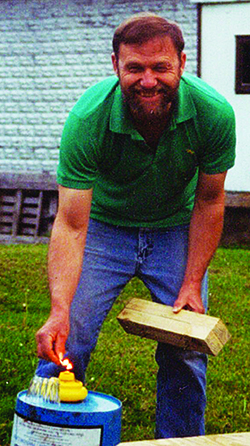Chronic Lymphocytic Leukemia Survivor
Put Cancer in the Back of Your Mind
 Until he had a heart attack, Harry Kruse didn't know he had chronic lymphocytic leukemia (CLL) and hemochromatosis. In spite of struggling with unusual treatment-related side effects, he decided to adopt a positive attitude. Today, he has frequent checkups to monitor the status of his CLL, and he enjoys life in Texas with his wife and family.
Until he had a heart attack, Harry Kruse didn't know he had chronic lymphocytic leukemia (CLL) and hemochromatosis. In spite of struggling with unusual treatment-related side effects, he decided to adopt a positive attitude. Today, he has frequent checkups to monitor the status of his CLL, and he enjoys life in Texas with his wife and family.
In 1992, when I was 46 years old, I had a heart attack. The doctors drew my blood and, a week later, I found out that my blood was abnormal — in more ways than one. After having a liver biopsy and bone marrow biopsy, I was diagnosed with chronic lymphocytic leukemia (CLL) and hemochromatosis, a condition in which there is too much iron in the blood. The treatment for hemochromatosis involved getting my blood drawn once a week to lower the iron levels. I am now in remission for that condition.
At the time the CLL was diagnosed, it was not active. My doctor told me that just because I had CLL, it didn’t mean it would ever flare up. He took a watchful waiting approach and continued to monitor me. My CLL was considered benign until 2005 when the lymph nodes under my arm and in my groin area swelled up. At that time, my doctor confirmed it had become active and that I would need treatment.
I began six months of chemotherapy. After about four treatments, I began to have the urge to take off all my clothes. My doctor took me off the chemotherapy right away and said I was having this unusual side effect because my CLL had gone into remission.
Another side effect of the chemotherapy was the loss of my appetite. I didn’t want to eat anything. I went from 178 pounds to 158 pounds. One day, as my sister-in-law drove me home from a treatment, she suggested making potato soup and grilled cheese sandwiches. It just sounded so good, and that’s when I started eating again.
In 2017, my oncologist began treating me with a targeted therapy drug. By the second week on the drug, I developed a horrible case of hiccups. Apparently, it was a rare side effect of the medication that occurred in only one in 1,000 cases. My hiccups were so bad that I went 36 hours without sleep. I tried every remedy that I could think of, including eating a tablespoon of peanut butter, which helped for an hour or two, and drinking vinegar. The hiccups were so bad that I could barely carry on a conversation. I called the doctor, who told me to go to the hospital.
After a week in the hospital, the hiccups were under control and I was allowed to go home. My doctor switched me to a different targeted therapy drug. I get little dots on my arms, chest and leg where the blood vessels are close to the surface, but it isn’t painful and I’m tolerating this drug well. Switching to this drug was one of the best decisions of my life. Other than the dots, I haven’t had any side effects from it, and I don’t have any problems with my appetite like I did on chemotherapy. I consider myself very lucky to have my appetite back.
Because the CLL lowers my immune system, I have to be careful about being around sick people and large crowds. At one point, I got pneumonia and was hospitalized for four weeks, two of which I was unconscious. My doctor said a healthy child’s immune system could have taken care of the infection but my immune system couldn’t. I was lucky to survive.
While going through treatment, I experimented with a few things. My niece recommended that I start drinking an instant breakfast drink that contained eight vitamins. I noticed that as long as I drank it every morning, my blood counts improved. When I stopped drinking it, my blood counts were not as good. I went back to drinking it, and my numbers have improved. I can’t say this is the right thing for everyone, but it seemed to help me.
I tried another experiment with exercise. I had been walking during treatment. When I had my blood checked, my numbers were good. For the next three months, I stopped exercising to see if it would have any impact on my blood counts. At the next visit, my numbers were not as good. I am convinced that walking works for me and helps my blood, so I make sure to walk as often as possible.
I decided to have a good attitude about the diagnosis. When people ask me how I am dealing with CLL, I tell them I put it all in the back of my mind and I don’t worry about it. Worrying about it doesn’t fix the problem because I can’t control what happens. I deal with the disease when I need to.
I also tell others with CLL not to worry. The stress can affect your whole body. You do what you can with what you can.


